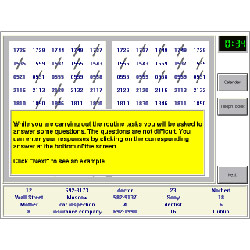
Simultaneous Capacity / Multi-Tasking - SIMKAP - 1 Year License
Model 64076
Intended for personnel selection, career counseling, diagnosis and assessment. Additional areas of use are traffic psychology (especially railway and aviation psychology), military psychology as well as within clinical settings.
Test Overview
"Simultaneous Capacity" and "Stress Tolerance" are two of the essential requirements for a multitude of professions. The present test provides a reliable way to measure both constructs.
Main Areas of Application
- Performance-oriented aptitude diagnostics
- Industrial and organizational psychology
- Clinical psychology
- Neuropsychology (to assess perceptive disfunctions e.g. dyslexia).
Theoretical Background
Operationally SIMKAP is based on the definition of Simultaneous Capacity and Stress Tolerance. Simultaneous Capacity is defined as the performance achieved when simultaneously dealing with routine tasks and tasks demanding cognitive performances (problem solving). More recently the term multi-tasking has been used to denote this talent. Stress Tolerance is defined as the extent to which performance differs when dealing with corresponding routine tasks under normal (baseline) and stress conditions
Administration
SIMKAP consists of five subtests. The first three represent the routine tasks and aim at measuring the baseline of Perceptual Speed and Accuracy. They differ in content (Numbers, Letters, Figures). The task is to identify and mark critical items as fast and accurately as possible. In the fourth subtest uncomplicated problem solving is required. The fifth subtest combines the previous ones - both routine tasks of Perceptual Speed / Accuracy and tasks involving problem solving have to be dealt with simultaneously.
Test Forms
At present there is one test form.
Scoring
The main scoring variables are Simultaneous Capacity and Stress Tolerance. Moreover, Perceptual Speed and Accuracy under normal (baseline) and stressful conditions are assessed.
Reliability
The reliability coefficients regarding the total performance for Simultaneous Capacity and Stress Tolerance vary between 0.94 and 0.97 and between 0.89 and 0.91 respectively. The parallel test reliability coefficients are 0.96 for Perceptual Speed (baseline) and 0.84 for Accuracy (also baseline).
Validity
The face validity is evident – the respondents think immediately of real situations where several things have to be handled simultaneously. The logical validity is given by the operational definition of Simultaneous Capacity and Stress Tolerance. Content validity has been proven through factor analysis. Prognostic validity has been demonstrated for occupations demanding, amongst other prerequisites, a high degree of Simultaneous Capacity and Stress Tolerance. Criteria used were "completed occupational education without complications" and "poor performance on the job".
A further study on prognostic validity carried out by the Swedish marine showed that the SIMKAP differentiates perfectly among speed boat commanders.
Norms
Norms of a sample of 436 Austrian adults is available. The norms are also broken down by level of education and age.
Testing Time
The required time for instructions, solving the practice items and actual testing time is approximately 40 minutes.
Note
For the administration of Simultaneous Capacity a sound card and speakers or headphones are necessary.
VTS System Overview
The Schuhfried VTS enables computer-assisted application of a large number of highly diverse psycho-diagnostic tests and measuring procedures. In developing the system much emphasis was placed on transparent structure and largely uniform design. It is therefore simple to operate and easy to understand and does not require any special computer skills.
The VTS basic module is required for administration of any of the available tests.
The Schuhfried VTS supports the administration of both single tests and test batteries. Many of the single tests are available in different test versions. These test versions may differ, for example, in terms of test duration or difficulty or may be parallel forms. They are characterized by different parameters reflecting specific test requirements. They have been designed for administration to a specific population (e.g. psychiatric patients, children, etc.) or for special measuring purposes (e.g. repeated measurements). Test batteries are compiled from the available single tests and test versions.
